
"Viking Age Iceland" by Jesse Byock (2001)
Digressio: A Christmas Story - Review of "Viking Age Iceland" by Jesse Byock (Part One)
My most poignant memory of the chilling and freezing effects of a North Atlantic winter are from about 1991 or 1992 and quite just the week before Christmas. Seasonal, on-call work was in a 10,000 pound facility called, "Hall's Harbour Lobster Pound", at the time, one of a handful in the Maritimes so small. My starting salary was at four dollars and fifty an hour a meagre chicken feeds compared to regulation forty in Korea or 150 in The UAE, but they bumped me up to seven fifty before I ended there nearly two or three years later. Now to tout the websites for "Buy Nothing Christmas".

http://www.adbusters.org/metas/eco/bnd/bnd_xmas/
http://www.buynothingchristmas.org/
My boss, my favourite boss by the way, of all time, was a very Scottish-looking and kind, soft-spoken man named Lewis MacDonald. He worked us there on and off whenever he called, which was pretty regularly, mostly full-time through summer seasons, with he and his wife, and his niece and nephew, Bobby and Wanda Vaughan, as well as the sales boss, Jack Hayward and his wife, and a few other seasonals, like Rene, and Danny Welton, and Norma, whose first reaction to difficult customers was a delicate tongue in cheek and rolling of the eye balls, and whose favourite cow was smart enough to open its gate and take off into the woods between East and West Hall's Harbour Roads for entire spring and summer seasons, and a few other villagers from the area. I even warmly remember the dalliances of a certain gift-shop girl (who is a professor of forestry science now) and a little hike up Cape Split.
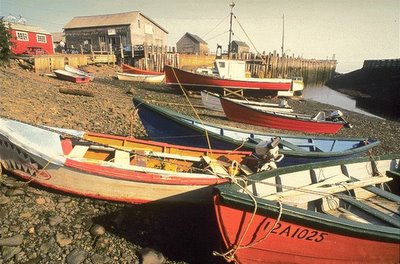
That was a comfortable and decent way to earn enough for ancillary expenses while studying at Acadia, and in a unique way learn the basics of good management, retail and wholesale sales and services, and working with a diverse and culturally challenging clientele, like the filling and refilling of "best damn dulse in the world" samples.
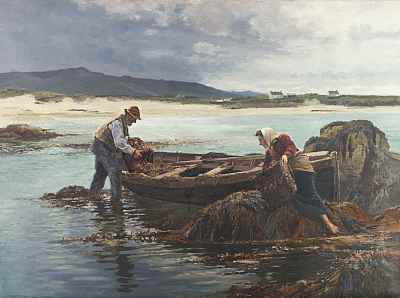
Mostly Lewis never yelled at anyone or ordered people around much, if at all, he just laid out what needed to be done, and added gentle error correction when required. The common sense secret to good management technique in my book, and while I never quite kept up with clearing the tanks of the dead like some of the other pickers, I did get a feeling and attachment for the neptune's net, a long handled pole gaffer with a netted cast-iron ring around the end, easily, if only gently used to scoop angry lobsters out of packed tanks without breaking their shells, and gained a skill with a wooden handled claw pike, which might have also been useful for hay-baling, but just as handy for roping unruly wooden packing crates. But only with practice.
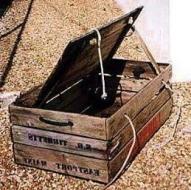
The job itself was fairly monotonous, but involved the team lifting of 70-90 pound crates of freshly caught lobsters on and off fully loaded two ton trucks for hours at a time, into and out of tanks on two stories, or three tiers of stacked tanks, with the ever present rushing waterfall sounds of aerated seawater sluicing down through the tanks. In addition, team work included grading lobsters out of those crates for hours at a time, often to entire AC DC albums, for which I have gained high regard as a result, onto electronic scales, and then distributing them through the tanks according to weights and sizes in small batch crates, where they were held for a few days until being styro-packed in cardboard liners with frozen gel packs for destinations such as London, Paris, Amsterdam, New York, Boston, or Tokyo, etc. One order was even for a load of culled, or one clawed (discounted) "chickens" the one to one and a quarter pound sizes, for the crews messes on board the Queen Elizabeth II.

Summer was a different story, and Hall's Harbour has the distinction of being one of the prettiest, oldest little places to be found on the Bay of Fundy, while Baxter's Harbour has taken my heart on that matter for quite some time (and my alder bushes pruning skills), where the North Mountain of the Annapolis Valley dips itself steeply into the sea, along a funneled peak of the eastern seaboard, which draws great powerful tides up and into the Minas Basin in such strength it actually tips the entire province of Nova Scotia over a little every time, and boasts of the highest and lowest tides in the world.

In the summer, the entire far-side of the North Mountain has an entirely different climate from the valley, and especially is nearly humidity free year-round, but really most appreciated by valley-dwellers in summer.
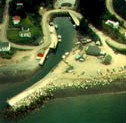
However a full stock of tourists made their way on in, up and over the brow of North Mountain, sometimes in fleets of buses, or shiny jet-stream towing convoys, or poke-along Sunday drivers in Panama hats, or souped up muscle cars and Indian motorcycle club enthusiasts. Every creep and creature, every happy family reunion, and the bespoken of caned, and the wrinkled-up prune people, mostly from the New England States, all in dribs and drabs on the foggy days, but in heaps on the sunny, muggy days, sometimes from as far away as California or Louisiana, those loping gaits and southern drawls, all races and languages combined, as they hopped, clumped and or rattled their ways in, along and on to the once dangerously leaning piers and rotting docks in and around old Parker's store. It was always a sight to see behemouth land yachts and road cruising motor homes, some as long as regular house trailers, peaking and bounding their wide suspensions up and down along the bumps of the near forty-five degree angled road of descent into the harbour itself, making or braking it straight into one of the tightest hair-pin 180 degree turns I have seen aside from those of the Neghrils to Ooty in Tamil Nadu.
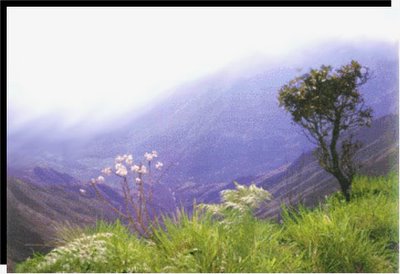
At this point in my little story here, where is the actual connection with Viking Iceland? OK then, it was Christmas Eve, and I had press-ganged one of my buddies, Ken Dekker, into coming along and working a twelve hour night shift. The pound was making some last minute orders for Europe on the overnight KLM from Halifax International, they needed some extra hands to pack, I think they were paying ten bucks an hour that shift. It was as bitterly cold as I can remember. It was the only time I made a quick run for the box shed from a gap next to the truck door and in a period of under a minute in the blistering frigid wind on the way out and on the way back in, the moisture of my breath froze ice into my scruffy unshaved face, maybe a week's worth of stubble, but the hoar froze instantly, and by the time I got back I felt like going home, it was just that cold. It was also the only time I had ever seen lobsters drenched in seawater, and inside out of the windchill quite beginning to freeze instantly just in the air before we could get them into the substantially warmer ice-gel lined styro insulated boxes. It was a dawn I remember having a trucker's breakfast at Irving Big Stop in New Minas at the end of it, and Ken was so done he was quite passing out over his grilled cheeses. I just never forgot how cold it was that night.

So goes a digressio to a multi-part review on this text, "Viking Age Iceland" by Jesse Byock (2001). That these fierce and fearsome Europeans willingly set out to raft across those frigid waters of North Seas and spume, soaked often to their pelted skins, grimly baring their teeth to the gales and gusts to settle upon an unseemingly rocky, appallingly and apparently bald landscape in the middle of some of the world's coldest winds and waters with its share of rogue icebergs, sprouting firey volcanos and rumbling coastlines merely proves the absolute insanity of their resolute, indefatigable characters. Who the hell else would have settled that place but a bunch of Vikings?
Leave it to the Icelandic Vikings. And so their descendants remain there, ensconsed, proud, and rightfully so, until some more serious characters dare to try to take it or want to take it from them, they can keep it. One Canadian who has learned the immediate limitations of human will in the face of cold, and dares not attempt to take on such a task. A mere memory, of one frigid winter night, in the cozy bosom of one of Canada's warmest Atlantic Coasts, a nearly fifteen years old memory here recounted, the cold prevents my desire from joining such a crew of characters from their very beginnings. It does sometimes take as long to thaw such an observation.

No comments:
Post a Comment